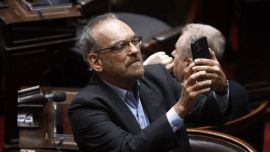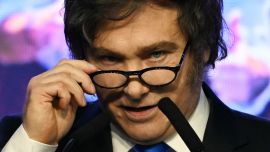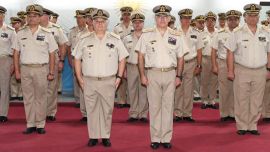In public, the International Monetary Fund sings nothing but praises for the austerity campaign Javier Milei has waged since winning Argentina’s presidency. Behind closed doors, however, the libertarian leader is still struggling to obtain more money from the IMF.
Just three months ago Milei said his government would “certainly” have a new programme with the IMF by year-end — replacing and potentially expanding the current US$44-billion deal that’s already the largest ever granted by the Fund. But after another round of talks this week underscored concerns about capital and foreign exchange controls, it became clear that Milei has more work to do before seeking fresh funds from the Washington-based lender.
It’s certainly a frustrating outcome for the libertarian economist turned president. In less than one year in office, he’s implemented more austerity measures than the Fund requested, revving his chainsaw deep into public spending to cut the equivalent of five percent of gross domestic product in investment, pensions and public wages. Equally importantly, he’s been able to do so without unleashing the type of social unrest his opponents or even his team feared. In fact, recent polls show he’s retained most of his popularity so far, even as the economy falls into its sixth recession in a decade.
At the heart of Milei’s success is a war against inflation that has limited the increase of consumer prices to less than four percent a month, compared with more than 25 percent in December. Yet it’s the same obsession with prices that’s getting in the way of a new agreement with the IMF.
Even as Managing Director Kristalina Georgieva says her priorities for Argentina are aligned with Milei’s, negotiations for a new programme continue to stall. The obstacle is Argentina’s edifice of capital and currency controls, known locally as the 'cepo,' which the country needs to dismantle to return to capital markets and obtain much-needed investment to grow again.
Asked about the talks that have taken place with Argentina this week, Luis Cubeddu, the IMF’s lead Argentina negotiator, said the Fund has stressed the progress in reducing inflation and establishing a strong fiscal anchor, while also emphasising remaining challenges.
“We discussed the need to gradually unwind some of the existing FX restrictions and controls,” he told reporters on Friday. “The discussions have deepened in an effort to better understand their plans. Authorities are exploring the options for them to move to a new programme.”
Asked to comment on the story, a government official downplayed any differences with the IMF and said that a new program can’t happen overnight.
The tension boils down to this: Argentina wants a fresh injection of money to lift controls without worrying about a currency sell-off that would send inflation spiralling and Milei’s popularity plummeting. But the IMF doesn’t want its resources used to artificially prop up a currency like Argentina has done so many times before.
“It seems that the Fund needs clarity on Argentina’s FX strategy before a new agreement,” said Ernesto Revilla, head of Latin America economics at Citigroup. “There’s a lot of uncertainty in the market about when this might happen, with many who don’t believe there will be big changes before midterm elections.”
Argentina’s legislative elections next October will give Milei a chance to increase his base of support in Congress. But they’re also likely to bring market and political volatility that would discourage any major policy change, including the removal of capital controls.
With or without money
With negotiations with the Fund wearing on, Milei and his team have adapted their rhetoric accordingly. In interviews, officials went from saying in April that they wanted fresh funds to lift capital controls to affirming earlier this month that they’re not necessary.
“The opening up of the cepo to the dollar is a lot closer than you can imagine,” Milei assured in a radio interview on Tuesday. “There’s an opening with and without funds. If you give me funds, I open it up today.”
Behind closed doors, Caputo still says Argentina would like to receive an injection of reserves that would allow the government to lift controls more easily, according to people who attended meetings with the minister. He also says that Argentina could lift controls without the IMF as the parallel and official foreign exchange rates converge and the bank rebuilds reserves, but it would take longer, the people said.
The size of a possible new programme matters less than how much of the total the IMF would agree to frontload, giving immediate ammunition to Milei.
Frustrated and angry
Milei’s frustration with the IMF has been in full display. In an August radio interview, the Argentine president called Rodrigo Valdés, the IMF’s top Argentina negotiator at the time, “truly irresponsible” for allowing problematic policies like unfettered money-printing in the former left-wing government.
Valdés, who had been appointed by Georgieva herself, was pulled from negotiations wit Argentina in September.
Argentina has had strict currency controls in place for nine of the past 13 years. They include a tightly managed exchange rate that is on average 20 percent stronger than the market rate. The government also limits the purchase of foreign currency for savings to US$200 a month per individual, charges taxes on overseas travellers and curtails US dollars for importers. Exporters, on the other hand, have to sell their dollars for pesos.
Milei has been sacrificing the country’s precious dollars to keep the peso overvalued because it’s key to maintaining inflation under control. Net international reserves now stand about US$5.5 billion in the red, according to Buenos Aires-based consultancy Eco Go. That’s still an improvement from the US$11-billion deficit inherited from the previous government. Caputo has told investors that low reserves are the weakest part of the programme, according to people familiar.
A new loan would be Argentina’s 23rd agreement with the IMF, making it the most frequent borrower the Fund has ever had. Its US$44-billion programme was given to former pro-market president Mauricio Macri and renegotiated under Milei’s left-wing predecessor. Most of its programmes have ended badly, notably the 2001 crisis when a collapsed IMF programme triggered deep recession and social unrest.
“The IMF has tried and failed to fix Argentina’s dysfunctional economy 22 times,” said Benjamin Gedan, director of the Wilson Center’s Latin America Program in Washington, DC. “Milei’s budget cuts do inspire confidence, but perhaps not enough for the Fund to open the purse strings. At least not yet.”
related news
by Manuela Tobias & Jorgelina do Rosario, Bloomberg


























Comments